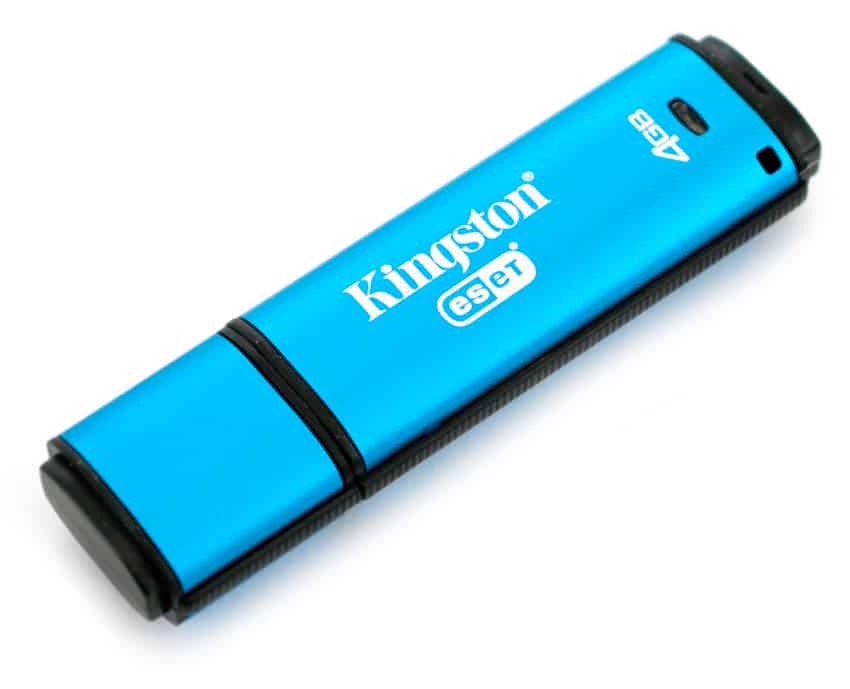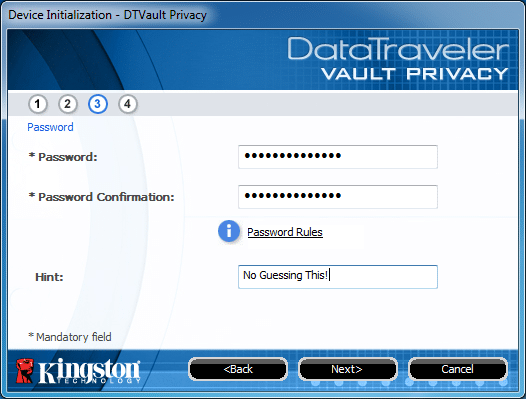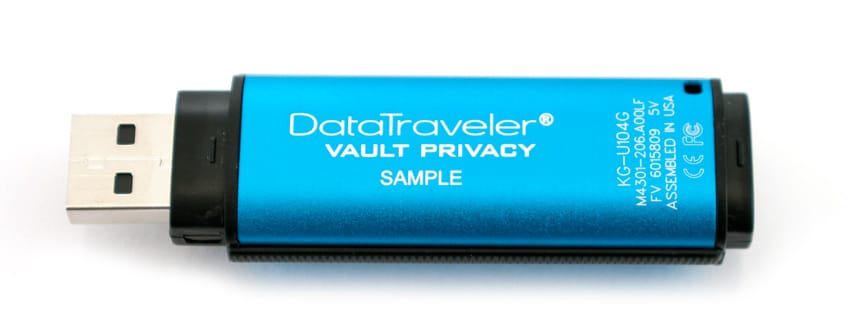
Kingston’s DataTraveler 4000 and DataTraveler Vault Privacy USB flash drives are now being offered with enhanced security functionality as part of a new partnership announced today between Kingston, ESET, and ClevX. Securely managing portable digital storage is one of the growing challenges for organizations rolling out infrastructure to support mobile devices and workers while maintaining the security and confidentiality of corporate systems and information. ClevX’s DriveSecurity brings additional value to the DT4000 and DTVP, which secure the contents of the drive with hardware-based 256-bit AES encryption in case the drive is lost or stolen. While our review features the DataTraveler Vault Privacy, the two devices are functionally identical other than with regard to FIPS certification, where the DataTraveler 4000 has been certified compliant for FIPS140-2 Level 2.
The DataTraveler 4000 (DT4000) and DataTraveler Vault Privacy (DTVP) will benefit from ESET anti-malware technology and NOD32 antivirus engine as part of ClevX’s DriveSecurity platform. DriveSecurity runs as a background process in Windows, where it monitors activity on the drive but does not otherwise interact with the host workstation.
DriveSecurity is implemented as a portable application installed on the drive, in order to prevent the spread of malware to secure systems when a drive is used both inside and outside of a protected environment. While these new features are not available on Mac and Linux platforms as with the drives’ encryption functions, part of DriveSecurity’s value proposition is its relative simplicity for the end user and that there is no need for administrative configuration prior to deployment.
The DataTraveler Privacy Vault locks down and reformats after a configurable number of failed password attempts, and offers a read-only access mode. Organizations can customize the case with their own logo and can preload content when ordering in quantity. Kingston provides a five-year warranty with technical support for the DVTP.
DataTraveler Privacy Vault Specifications
- Dimensions: 3.06" x 0.9" x 0.47" (77.9mm x 22mm x 12.05mm)
- Capacities: 2GB, 4GB, 8GB, 16GB, 32GB, 64GB
- Operating Temperature: 32°F to 140°F (0°C to 60°C)
- Storage Temperature: -4°F to 185°F (-20°C to 85°C)
- TAA-compliant
- USB 2.0
Usability
The DataTraveler Vault Pro is intended for applications where end users may be performing the initial configuration rather than IT staff. Installation of the software was fairly painless, with a setup utility thats walks you through setting up the password of the device and formatting the encrypted section. Kingston provides access and configuration software for Windows, Mac, and Linux, but DriveSecurity features are only available for Windows.
When the host machine is connected to the Internet, DriveSecurity attempts to update its local copy of ESET’s virus signature database every hour. Multiple DriveSecurity devices may be used on the same host machine at the same time without conflict. When using multiple devices, DriveSecurity status information pertaining to each drive is available through separate system tray icons.
Design and Build
The DataTraveler Vault Privacy features a waterproof aluminum casing that gives the thumbdrive a very sturdy feel.
Encryption hardware and a waterproof case mean that the DataTraveler Vault Privacy is not among the smallest of USB drives, however the DTVP is of comfortable size and weight to be carried in a pocket or hung on a lanyard or keyring.
At 0.9" wide, it may be too wide to cooexist with neighboring USB devices on host devices with tightly-spaced USB ports. Kingston recommends connecting the DTVP directly to a USB port on the host device rather than via a USB hub.
Performance
Using Iometer on our consumer test platform, we measured performance over USB 2.0 as follows:
- 2MB Sequential write: 11.3MB/s
- 2MB Seq read: 29.2MB/s
- 4K random read: 1,477 IOPS
- 4K random write: 4.3 IOPS
Overall the DataTraveler Vault Privacy performs in line with general purpose USB flash drives. The DTVP’s low 4k random write performance means that you probably won’t want to be editing multiple files simultaneously from the device itself, but instead transfer completed files over to take advantage of its better sequential access.
Conclusion
The Kingston DataTraveler Vault Privacy does a lot of things right. It provides a straightforward, multi-platform GUI for basic configuration that makes supporting a large deployment simpler for applications where end users manage the drive. DriveSecurity, while limited to Windows support, provides a measure of added protection to systems and information that will not moot other security measures but could help reduce the threat of malware moving between secure and insecure environments.
Pros
- Good build quality
- Encryption engine can be configured by end users
- 5-year warranty and technical support
Cons
- Slow 4K random write performance
- DriveSecurity features are limited to Windows operating systems
Bottom Line
The DataTraveler Vault Privacy provides reasonable general purpose performance while offering multi-platform hardware encrypted storage. It’s new DataSecurity features, while limited to Windows, add value by serving as a front line against malware intrustion in an era when portable storage is increasing the number of potential contact points between secure and unsecure networks.




